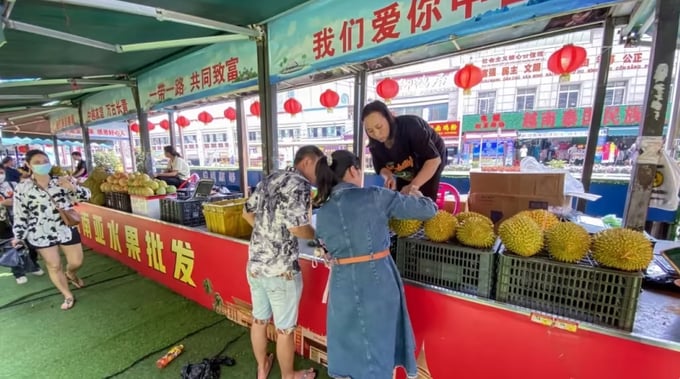May 22, 2025 | 01:50 GMT +7
May 22, 2025 | 01:50 GMT +7
Hotline: 0913.378.918
May 22, 2025 | 01:50 GMT +7
Hotline: 0913.378.918

Durian is now the most popular imported fruit in China, with billions of US dollars in sales a year. Photo: Bob Wang
China imported 1.4 million tonnes of durian in 2023, up 69 per cent from the previous year according to data from China’s General Administration of Customs.
Thailand’s share of those imports, in US dollar terms, dropped from almost 100 per cent in 2021 to 95.36 per cent a year later and 67.98 per cent last year.
Vietnam has cut in on Thailand’s stake after China began letting Vietnamese exporters ship fresh durians in 2021.
Vietnamese durian exports to China went from near zero to a 4.6 per cent share at US$188.1 million in 2022, and soared to 31.8 per cent last year for a total value of US$2.1 billion.
The United Nations Food and Agriculture Organization said Vietnamese exports of the fruit worldwide reached 4.9 per cent of the total by volume in 2022 at 40.88 million kilograms, adding Vietnam’s share was less than 1 per cent the previous year and zero before that.
Vietnam is aiming to reach US$3.5 billion in durian turnover this year – a surge of 55 per cent from last year – by tapping deeper into the Chinese market, the country’s Department of Foreign Information projected last week.
More than 90 per cent of durian exports reach China, HSBC said in a research report last year.
Durian has become a prized object for China’s middle class. Though reviled by some for its smell, the thorn-covered crop commands a high price and has amassed a sizeable contingent of devotees, who dub it “the king of fruit”.
Many Vietnamese farmers have replanted fields and bought new equipment to switch to growing durians, said Nguyen Thanh Trung, a political scientist at Fulbright University Vietnam.
“Vietnamese farmers know how to rotate crops and lengthen the harvest,” Nguyen said. “Durian is considered a cash crop in Vietnam and it can bring a lot of benefits. The farmers know how to maximise their chances.”
The Philippines has gained a sliver of market share, too. A year ago this month, China agreed to start importing fresh Philippine durians, which grow largely in the volcanic soil of Mount Apo on the southern island of Mindanao.
Philippine durian exports to China were valued at US$1.88 million from January to June 2023, the government-run Philippine News Agency reported.
The Philippines took a 0.2 per cent share of China’s durian imports last year by US dollar value, Chinese customs data shows.
Durian growers still prioritise the domestic market and export the excess, said Jonathan Ravelas, managing director of the Manila-based consultancy eManagement for Business and Marketing Services.
China also announced last year that it had successfully grown its first domestic crop on the southern island of Hainan.
“Domestic durians are expected to have a production of 250 tonnes this year, and by next year they could be available on the market in bulk, and by then the production could reach 500 tonnes,” said Feng Xuejie, director of the Institute of Tropical Fruit Trees at the Hainan Academy of Agricultural Sciences.
Last year, Hainan achieved total production of 50 tonnes, which Feng said was not enough to satisfy hungry Chinese consumers.
“As for the price and flavour of domestic durians in the future, let’s just wait and see,” Feng added.
Shipping from the Philippines to China generally costs more than what other Southeast Asian exporters pay, because of distance and infrastructure barriers. That could change, Ravelas said.
“The Philippines at the moment is the first potential alternative supply point,” he said. “The government will probably improve on farm infrastructure, like cold storage.”
Durian exporters in Malaysia are pushing for a deal this year to celebrate the 50th anniversary of diplomatic relations with China, said Simon Chin, founder of the Malaysian exporter DKing. Today, Malaysia is only allowed to ship frozen durians.
“Now we are talking to China to explore fresh fruit exports, like the Thais and what they did,” Chin said.
In terms of income, Thailand’s durian shipments to China still went up last year in the aggregate as the consumer market in China’s mid-sized cities began to ripen, said Sam Sin, development director at S&F Produce Group in Hong Kong. S&F ships durian from Thailand.
“The supply is never enough for China,” Sin said. “Right now, (the market) is quite developed in the first- and second-tier cities, but not in the third, fourth and fifth.”
(CNA)

(VAN) Attempts to bring down the price of the Japanese staple have had little effect amid a cost-of-living crisis.

(VAN) Fourth most important food crop in peril as Latin America and Caribbean suffer from slow-onset climate disaster.

(VAN) Shifting market dynamics and the noise around new legislation has propelled Trouw Nutrition’s research around early life nutrition in poultry. Today, it continues to be a key area of research.

(VAN) India is concerned about its food security and the livelihoods of its farmers if more US food imports are allowed.

(VAN) FAO's Director-General emphasises the need to work together to transform agrifood systems.

(VAN) Europe is facing its worst outbreak of foot-and-mouth since the start of the century.

(VAN) The central authorities, in early April, released a 10-year plan for rural vitalization.